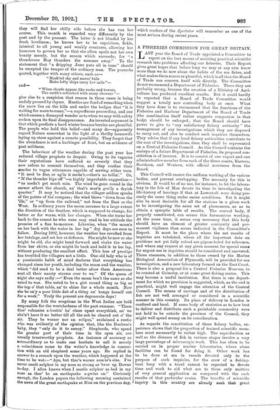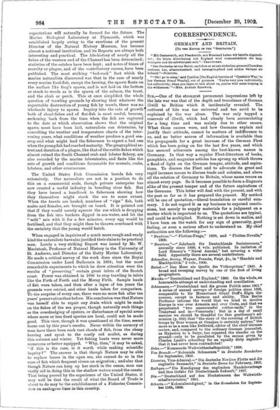A FISHERIES COMMISSION FOR GREAT BRITAIN.
TAST year the Board of Trade appointed a Committee to 4 report on the best means of assisting practical scientific research into problems affecting our fisheries. Their Report gives great hopes that before long we may at any rate know more than we do now about the habits of the sea fishes, and what makes them scarce or plentiful, which is all that the Board of Trade can concern itself with directly. The Committee do not recommend a Department of Fisheries. There they are probably wrong, because the creation of a Ministry of Agri- culture has produced excellent results. But it could hardly be expected that a Board of Trade Committee would suggest a totally new controlling body at once. What they have done is to recommend that the functions of the Fisheries and Harbour Department of the Board of Trade (the combination itself rather suggests congestion in that body) should be enlarged; that the Board should have power to give to "any satisfactory fishery authority" the management of any investigations which they are disposed to carry out, and also to conduct such inquiries themselves. They advise that if any local fishery authorities contribute to the cost of the investigations, then they shall be represented on a Central Fisheries Council. As this Council contains the embryo of a future Department of Fisheries, its proposed con- stitution is of interest. It is to consist of one expert and one administrative member from each of the three coasts, Eastern, Southern, and Western, with official nominees from the Board.
This Council will ensure the uniform working of the various bodies, and prevent overlapping. The necessity for this is obvious. It would be of no use, for instance, to let the labora- tory in the Isle of Man devote its time to investigating the life-history of herrings if that at Lowestoft were doing pre- cisely the same thing under easier conditions. Yet it might also be most desirable for all the stations in a given week to be investigating the same set of phenomena, so as to obtain a synoptic table of results. The central body, if properly constituted, can secure this harmonious working. At the same time, it seems very necessary that this body should have an element of greater continuity and per- manent vigilance than seems indicated in the Committee's Report. It must be the place where the net results of inquiries are tabulated, where all the important data on problems not yet fully solved are pigeon-holed for reference, and where any request at any given moment for special sums for urgent use in inquiries should be considered and answered. Three steamers, in addition to those owned by the Marine Biological Association of Plymouth, will be provided for sea investigation, and a new laboratory formed on the East Coast. There is also a proposal for a Central Fisheries Museum, to be created at Grimsby, or at some great fishing centre. This may become a useful institution. But there is one depart- ment for which no provision is suggested, which, as the end is practical, might well engage the attention of the Central Council. The means of carriage and of the distribution of fish are not well arranged or considered in a scientific manner in this country. Its place of delivery in London is confined and local. If some body of statistics as to how best to deliver and distribute such a perishable commodity were not held to be outside the province of the Council, they might well spend money on its consideration.
As regards the constitution of these fishery bodies, ex- perience shows that the proportion of trained scientific mem- bers must necessarily be rather high. The reproduction as well as the diseases of fish in various stages involve a very large percentage of microscopic work. This has often to be carried on in proper marine laboratories, where alone facilities can be found for doing it. Other work has to be done at sea in vessels devoted only to the purpose of such inquiries, for the crew of a fishing- boat busy with a trawl cannot be expected to devote time and work to aid what are to them only matters of very general application as compared with the cash results of that particular cruise. The benefits of scientific inquiry in this country are already such that great expectations will naturally be formed for the future. The Marine Biological Laboratory at Plymouth, which was established largely owing to the exertions of the present Director of the Natural History Museum, has become almost a national institution, and its Reports are always both interesting and practical. The life-history of nearly all the fishes of the western end of the Channel has been determined; statistics of the catches have been kept ; and notes of times of scarcity or plague, and of the contributory causes, have been published. The most striking " bed-rock " fact which the marine naturalists discovered was that in the case of nearly every marine food-fish, except the herring, the spawn floats on the surface like frog's spawn, and is not laid on the bottom or stuck to weeds as is the spawn of the salmon, the trout, and the chub or perch. This at once simplified the whole question of trawling grounds by showing that whatever the regrettable destruction of young fish by trawls, there was no wholesale injury to spawn. Inquiry into the rate of growth' both of shoal-fishes and of flat-fish is most useful, because,
reckoning back from the time when the fish are captured to the date at which observation shows that the original spawn must have been laid, naturalists can determine, by consulting the weather and temperature charts of the inter- vening years, what conditions of weather produce a good sea- crop and what might lead the fishermen to expect a bad one when the young fish bad reached maturity. The geographical ex- tent and duration of a plague, like that of the cuttle-fishes which almost ruined the South Channel crab and lobster fishery, are also recorded by the marine laboratories, and facts like the rate of growth and conditions favourable for mussels, crabs, lobsters, and other crustaceans.
The United States Fish Commission breeds fish very extensively. Our naturalists are not in a position to do this on a commercial scale, though private enterprise has now created a useful industry in breeding river fish. But they have issued a handbook to fishermen showing how they themselves might stock the sea to some extent. When the trawls are hauled, numbers of " ripe " fish, both males and females, are brought on board. It is pointed out that if they would merely squeeze the roe which is dropping from the fish into buckets dipped in sea-water, and let the " milt" mix with it for a few minutes, every egg would be fertilised, and that they might then be thrown overboard with the certainty that the young would hatch.
When engaged in inquiries of a much more rough-and-ready kind the naturalists have also justified their claim to be practical men. Lately a very striking Report was issued by Mr. W. Macintosh, Professor of Natural History in the University of St. Andrews, and Director of the Gatty Marine Laboratory. He made a critical survey of the work done since the Royal Commission under Lord Dalhousie in 1884 ; but the most remarkable experiments to which he drew attention were the results of " preserving " certain great inlets of the Scotch coast. Power was obtained in 1886 to stop trawling in inlets like the Firth of Forth and the Moray Firth. Sample hauls of fish were taken, and then after a lapse of ten years the grounds were retried, and other hauls taken for comparison. To the surprise of every one, there were no more fish after ten years' preservation than before. His conclusion was that Nature was herself able to repair any drain which might be made on the fishes of the sea proper, though naturally such things as the overdredging of oysters, or disturbance of special areas where more or less fixed species are local, could not be made good. This view, though it was questioned at the time, seems borne out by this year's results. Never within the memory of man have there been such vast shoals of fish, from the cheap herring and sprat to the costly red mullet, as during this autumn and winter. Yet fishing boats were never more numerous or better equipped. " Why, then," it may be asked, " if this is the case, is it worth while making scientific inquiry ?" The answer is that though Nature may be able to replace losses in the open sea, she cannot do so in the case of fish which frequent rivers on migration ; and also that though Nature can keep up her stock in the ocean, man can vastly aid in doing this in the shallow waters round the coasts. That being proved by the experience of the United States, it may well be that the result of what the Board of Trade is about to do may be the establishment of a Fisheries.Commis- sion on analogous lines in this country.











































 Previous page
Previous page